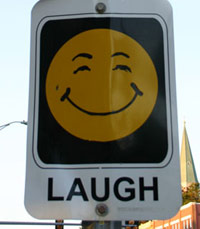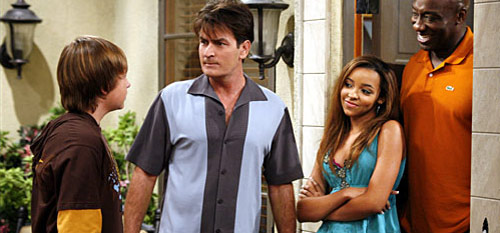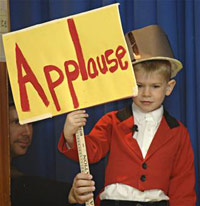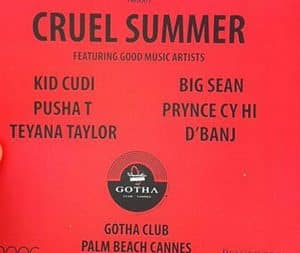It's a widely accepted fact that if you wander through life spouting one witty line after another at the appropriate moments, you'll be greeted by raucous laughter and thunderous applause. At least that's what sitcoms—specifically laugh tracks—have engineered us to believe. In reality it's hard to get people to laugh at your shitty jokes; any stand-up comedian will tell you that. So why does it sometimes seem like laughter is everywhere and people are amused by nothing? Because laughter has replaced smiling as the socially accepted way to react to something, whether it's funny or not.
 Go do this experiment: get into a crowded elevator and loudly say, "Wow, it's a cold one today!" Now count how many people either chuckled or laughed at your "joke." I'm willing to bet at least 50% of the people you're surrounded by will pretend to be amused by your observations about the temperature—and they're all lying.
Go do this experiment: get into a crowded elevator and loudly say, "Wow, it's a cold one today!" Now count how many people either chuckled or laughed at your "joke." I'm willing to bet at least 50% of the people you're surrounded by will pretend to be amused by your observations about the temperature—and they're all lying.
Who's to blame for this surplus of laughter? As with most of my life's problems, I place the blame squarely where it belongs: on technology. Specifically, television and cell phones. Turn on any modern 30-minute sitcom and you'll see shows like Two and a Half Men or Big Bang Theory filled with disembodied laughter because the producer doesn't think the audience realizes that the things the characters are saying are jokes. Thankfully, we invented something called the laugh track in the 60's and haven't looked back since. Now it's okay if you're not smart enough to realize you're watching something funny: the TV will tell you when you should express your enthusiasm. It wouldn't be that bad if the situations were truly funny, but either the writers think that every one of their jokes is pure comedy gold or that their audience is too dense to "get it"; and based on the episode of Two and a Half Men I watched last night, it's safe to say it's not the former.

"You're the only one not laughing kid, PULL IT TOGETHER!!"
It wouldn't be fair to place the blame solely on TV; we're part of the problem too. All of the "lol's" and "hahaha's" we've been texting each other have leaked out of our cell phones and into our daily vernacular. The first response to anything someone says is either a smile or a laugh, because we believe that's polite. But how many times have you asked a friend something only to have them laugh and then ask you to repeat what you said because they didn't hear it? Try going through an entire day at school or work while only laughing naturally and let me know how long it takes for someone to ask you if you're having a bad day.
If you think that we can cure this problem by going SMS-less in favor of good old-fashioned "talking on the phone," then think again. Since you can't physically see the person you're talking to, we rely on noise to make sure that the person on the other end hasn't grown tired of us and fallen asleep. That's why we feel compelled to laugh during phone conversations even if there's no joke being made; we're like retarded bats that need the noise to avoid hitting the walls of the cave.
 Maybe it's because I live in Canada, where people will offer you their liver if it even looks like you have a drinking problem, but judging by the NFL pre-game shows and American talking-shows (I can't call it the news) that I keep getting conned into watching, TV personalities only need to work 10% of the time they're on screen. The other 30% is taken up by colorful graphics that I imagine look like Michael Bay's wet dreams, and the last 60% is just a circlejerk where the talking heads giggle at every inane comment that pops into their heads.
Maybe it's because I live in Canada, where people will offer you their liver if it even looks like you have a drinking problem, but judging by the NFL pre-game shows and American talking-shows (I can't call it the news) that I keep getting conned into watching, TV personalities only need to work 10% of the time they're on screen. The other 30% is taken up by colorful graphics that I imagine look like Michael Bay's wet dreams, and the last 60% is just a circlejerk where the talking heads giggle at every inane comment that pops into their heads.
There has to be a revolution to remind people what's funny again. Of course I'm not talking about an Egyptian-style revolution because, let's face it, those aren't funny, but if we could just get Dave Chappelle back from his "vacation" then not only would we be reminded what is funny, we could start to ridicule everything that isn't. Look out Charlie Sheen and the other one and a half men.


